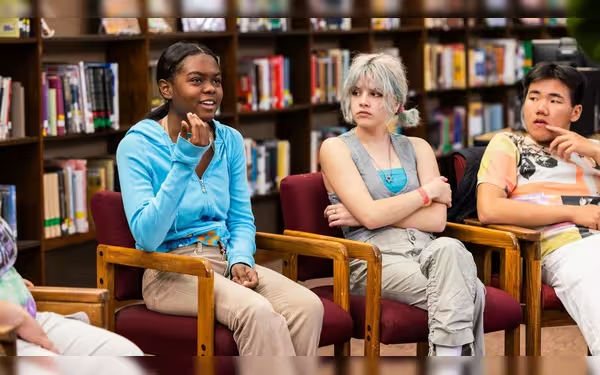Saturday, November 16, 2024 07:28 PM
Exploring Teen Lives in FX's 'Social Studies' Docuseries
- Teens navigate online identities post-pandemic.
- Social media influences youth aspirations significantly.
- Open discussions reveal isolation among teenagers.
 Image Credits: mashable_me
Image Credits: mashable_meFX's 'Social Studies' explores the online lives of teens navigating identity and social media pressures post-pandemic.
The digital landscape has transformed the way teenagers interact, communicate, and express themselves. In the wake of the COVID-19 pandemic, many high schoolers found themselves navigating a world where social media became their primary means of connection. FX's docuseries, "Social Studies," delves into this phenomenon, offering a candid look at the lives of teens as they emerge from lockdown and grapple with the complexities of their online existence.
Directed by renowned photographer and documentarian Lauren Greenfield, "Social Studies" follows a diverse group of teenagers from the Los Angeles area. The series captures their experiences as they adjust to a new normal, exploring themes of sexuality, materialism, and the pressures of social media. Each teen's story is unique, yet they all share a common struggle: the challenge of balancing their online personas with their real-life identities.
Greenfield's approach to the series is both innovative and revealing. She required her cast to share not only their lives but also their phones, allowing viewers to witness their digital interactions in real-time. This decision highlights the extent to which social media influences their daily lives, from the way they seek validation through likes and reposts to the unhealthy relationships that can develop online.
In her discussions about the project, Greenfield reflects on her motivations and observations. She notes that her interest in the impact of media on youth began with her earlier work, which focused on how Hollywood's values shape teenagers' aspirations. The shift to social media has only intensified these influences, with many teens expressing a desire to be "rich and famous" rather than pursuing traditional career paths.
Greenfield's own experiences as a parent further fueled her curiosity. She observed stark differences between her two children, one of whom engaged with social media casually, while the other was deeply immersed in it. The pandemic exacerbated these dynamics, as online interactions became a lifeline for many teens, leading to increased social anxiety and a reluctance to return to in-person schooling.
Throughout the series, the teens exhibit a surprising level of openness. Greenfield emphasizes the importance of creating a safe space for them to share their thoughts and feelings. The group discussions reveal that many teens feel isolated in their struggles, and by sharing their experiences, they find solace in knowing they are not alone.
Ultimately, "Social Studies" serves as a poignant reminder of the challenges faced by today's youth. As they navigate the complexities of adolescence in a digital age, it is crucial for parents and society to understand the pressures they encounter. By fostering open communication and empathy, we can help guide the next generation through the often turbulent waters of growing up in a hyper-connected world.













